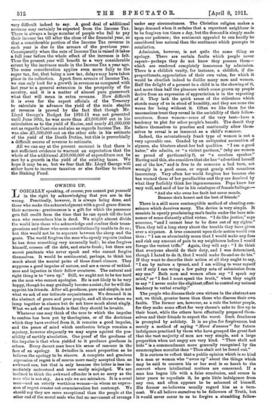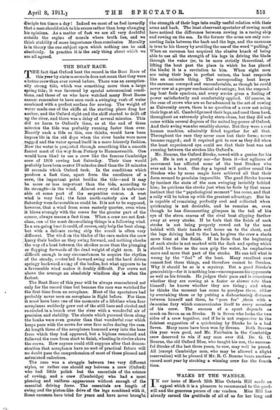OWNING UP.
TOGICALLY speaking, of course, you cannot put yourself ./ in the right by acknowledging that you are in the wrong. Practically, however, it is always being done, and those who make the acknowledgment with a good grace disarm their accusers : graciousness is a gift for which the possessor gets fall credit from the time that he can speak till the last man who remembers him is dead. We might almost divide the world into those who acknowledge and confess their trans- gressions and those who seem constitutionally unable to do so ; but this would not be to separate between the sheep and the goats. The world forgives the man who openly repents (unless he has done something very unusually bad); he also forgives himself, crosses off the debt, and starts fresh ; but there are secret penitents who never speak and who cannot forgive themselves. It would be sentimental, perhaps, to think too much about the mental pains of these dumb sinners. They suppress a good impulse of nature, and are a cause of unkind- ness and injustice in their fellow creatures. The natural and right thing is to "own up." Still, we ought not to be too hard on the man who cannot apologise. He is not likely to be very happy, though he may gradually become a saint ; for he will dis- appoint his friends. Alter all, goodness, pure and simple, is not what we ask of our intimate acquaintance. We demand it in the abstract of peers and poor people, and all those whom we lump together in classes but do not know much about singly. What wo ask of our friends is that they should be lovable.
Whatever one may think of the uses to which the impulse to confess has been put by theologians, or of the doctrines which they have evolved from it, it remains a good impulse, and the peace of mind which confession brings remains a mystery, however eloquently we may argue against the pos- sibility of earthly absolution. One proof of the goodness of the impulse is that when yielded to it produces goodness in others. Every decent man loses his sense of rancour in the face of an apology. It dwindles in exact proportion as he believes the apology to be sincere. A complete and gracious expression of regret is of course more easily accepted than an awkward one, but that is only because the latter is less im- mediately understood and more easily misjudged. We are inclined to think the awkward offender is not so sorry as the man who is not shy. As a rule we are mistaken. It is a. cruel man—and an utterly worthless woman—in whom an expres- sion of regret creates not commiseration but contempt. We should say they are more exceptional than the people at the other end of the moral scale who feel no movement of revenge
under any circumstances. The Christian religion makes a large demand when it ordains that a repentant neighbour is to be forgiven ten times a day, but the demand is simply made upon our patience; the sentiment appealed to can hardly be considered less natural than the sentiment which prompts to retaliation.
Admission, however, is not quite the same thing as apology. There are certain faults which people never repent—perhaps they do not know they possess them— which are rendered completely innocuous by admission. There is a childish vanity, for instance, a childish, if dis- proportionate, appreciation of their own value, for which it would be churlish indeed to dislike many men and women. Half the delight of a present to a child is in the showing of it, and more than half the pleasure which some grown up people derive from an expression of appreciation is in the repeating of it. They lack the quick sense of the ridiculous which stands many of us in stead of humility, and they are none the worse for being without it. Often we like them for the unconscious trust they reveal in the amiability of their fellow- creatures. Some women—some of the very best—have a tendency to plot for other people's benefit. The deceit they believe themselves to practise and continually allow them- selves to reveal is as innocent as a child's romance.
Indeed, the ostentatiously frank type of woman is not a very agreeable one. Goaded by an antiquated accusation of slyness, she blusters about her bad qualities. " I am a good hater," she admits, or " a violent partisan," (why are women so proud of partisanship P), or " a careless speaker." Having said this, she considers that she has "advertised herself out of the law," and is free to do someone a bad turn, act wrongly in a good cause, or repeat gossip with conscious inaccuracy. Very often her world forgives her because she has warned them of her peculiarities and they are deceived by what they foolishly think her ingenuousness. Pope knew ber very well, and said of her in his catalogue of female failings: "And she who owns her fault but never mends, Because she's honest and the best of friends."
There is a still more contemptible method of cheating con- science which deceives many. The device is very simple. It consists in openly proclaiming one's faults under the bare mis- nomer of some distantly allied virtue. "I do like justice," says someone, "and I cannot bear to be done out of my rights." Then they tell a long story about the trouble they have given over a sixpence. A true comment upon their action would run thus : " I am so abominably mean that I would make any fuss and risk any amount of pain to my neighbours before I would forego the veriest trifle." Again, they will say : " I do think that everyone should do their duty, and I was determined, though I hated to do it, that I would make So-and-so do his." If they want to describe their action at all they ought to say, "I am by nature a tyrant, and I am willing to wear myself out if only I can wring a few paltry acts of submission from any one." Both men and women often say " I speak my mind," or "I feel I must speak the truth," when they ought to say " I never make the slightest effort to control my natural tendency to verbal cruelty."
The people who discuss their own virtues in the abstract are not, we think, greater bores than those who discuss their own faults. The former are, however, as a rule the better people, for they make some effort for very shame's sake to live up to their boast, while the others have effectually prepared them- selves and their friends to expect the worst. Such frankness is prompted by subtlety. It is no plea for forgiveness, but merely a method of saying "Merci d'avance " for future indulgence practised by those who have grasped the great fact that the vast majority of men are very simple, and a large proportion when not angry are very kind. " Thou shalt not hide" is a commandment more generally recognised by the commonplace moralist than "Thou shalt not be found out."
It is curious to reflect that a public opinion which is so kind to a man or woman who "owns up" about the things which may be said to concern his or her soul is so harsh to the convert where intellectual matters are concerned. If a man has begun life with a false conclusion, and comes in later years to repudiate it, he gets little indulgence from any one, and often appears to be ashamed of himself. His former co-believers usually regard him as a turn- coat. We all believe ourselves to be followers of Truth, but it would never occur to us to forgive a stumbling fellow-
disciple ten times a day ! Indeed we most of us feel inwardly that a man should stick to his errors rather than keep changing his opinions. As a matter of fact we are all very doubtful outside the region of morals where truth lies, and we think stability of more importance than conclusion Morality is in theory the one subject upon which nothing can be said absolutely. In practice it is the only thing about which we are all agreed.











































 Previous page
Previous page